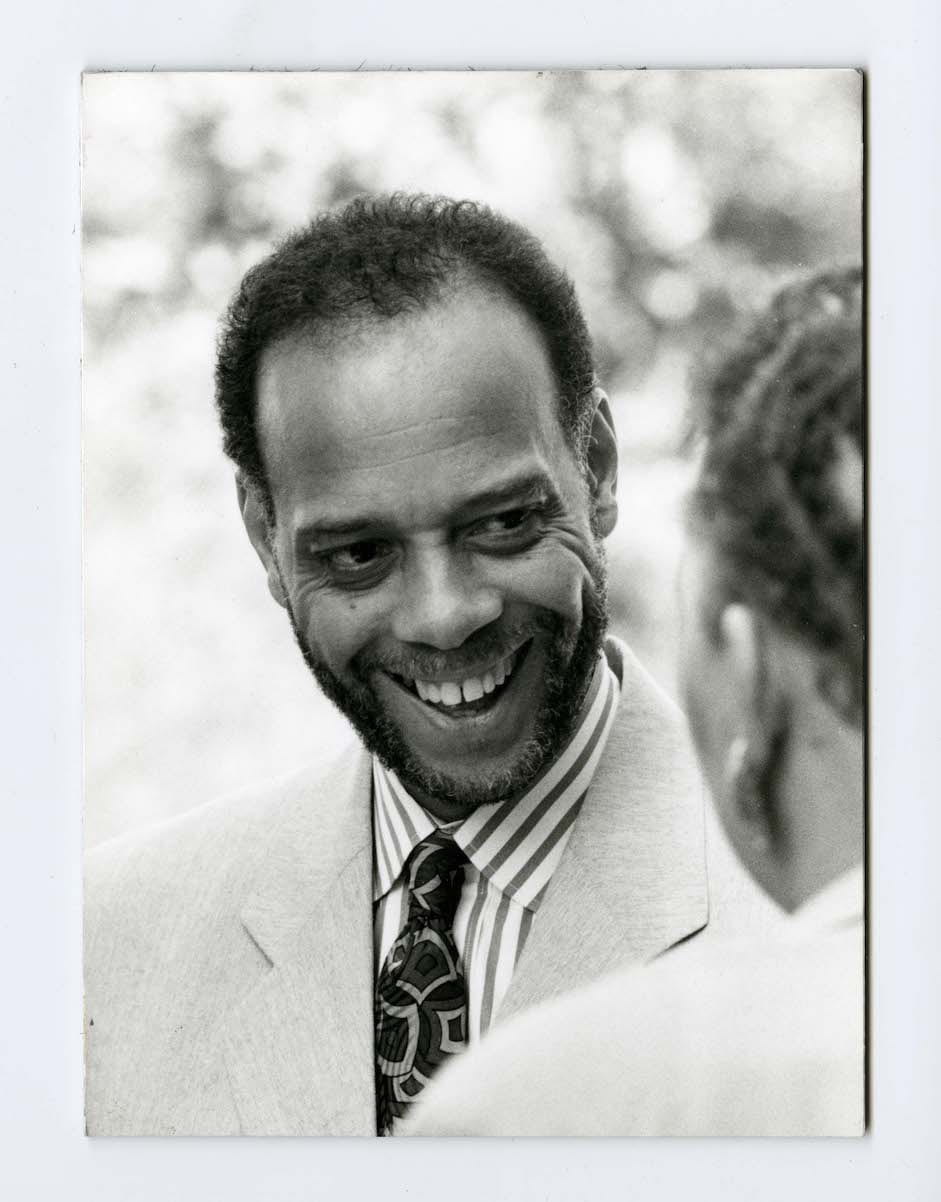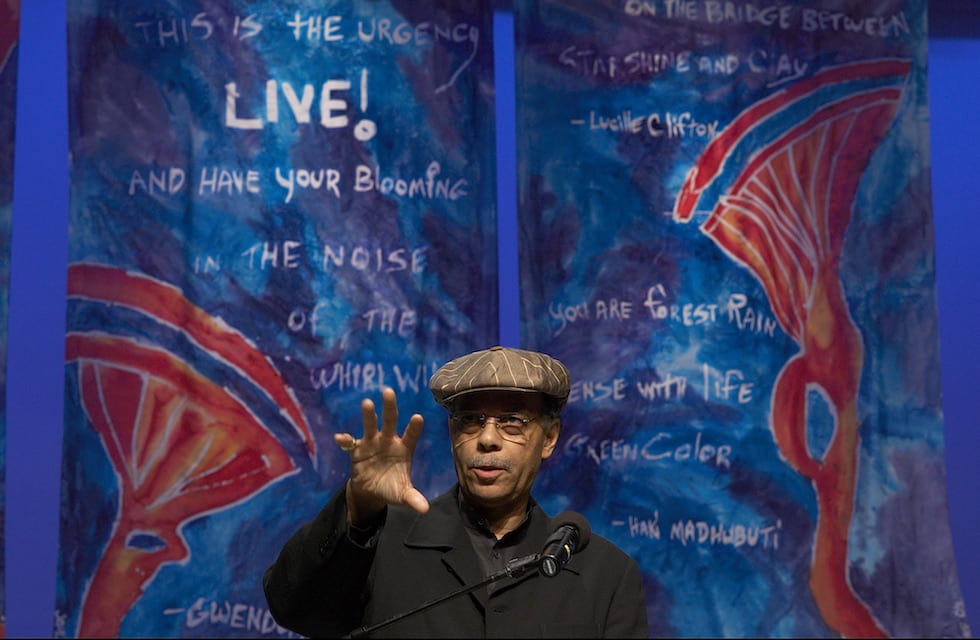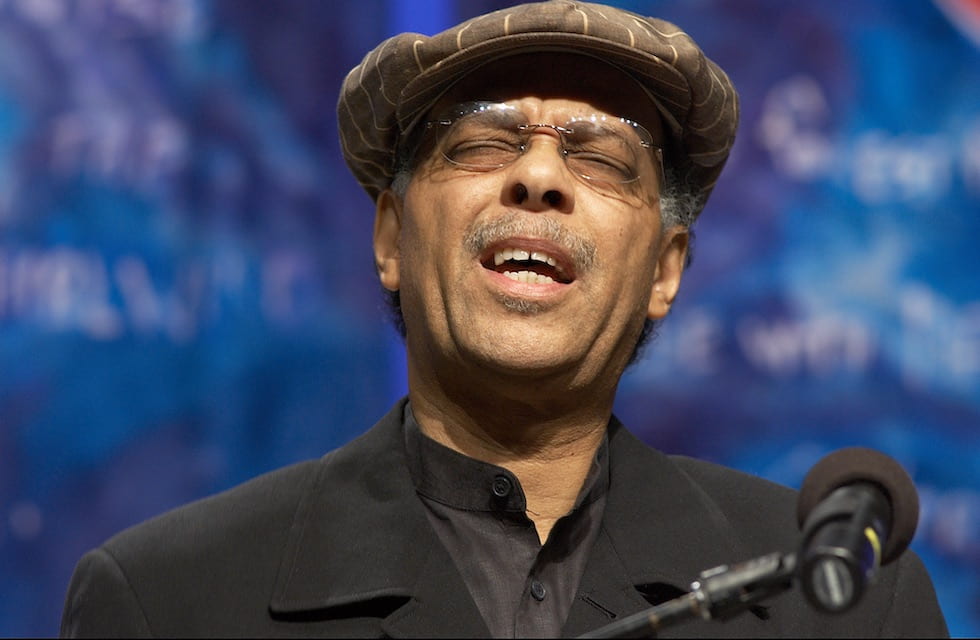Haki Madhubuti
“What the poetry does, and what it did for me, has
essentially said: Look, we don’t have to apologize to anybody.”

In 1994, Haki R. Madhubuti, born Don L. Lee, was one of the most distinctive and searing voices in contemporary poetry. Best known as a poet, he has worked as an essayist, critic, publisher, social activist, and educator. He was the founder and editor of Third World Press and Black Books Bulletin in Chicago, as well as a founding member of the Organization of Black American Culture Writers Workshop (OBAC). Madhubuti received his MFA from the University of Iowa and was a professor of English and director of the Gwendolyn Brooks Center at Chicago State University. Since the 1994 conference, Madhubuti has published over 30 books of poetry and essays, including: Think Black (1967); Black Pride(1968); Don’t Cry, Scream (1969); Killing Memory, Seeking Ancestors (1987); Claiming Earth: Race, Rage, Rape, Redemption (1994); GroundWork (1996); YellowBlack (2005); and more recently Taking Bullets: Terrorism and Black Life in Twenty-first Century America (2016). He has been the recipient of an American Book Award, two National Endowment for the Arts (NEA) fellowships, and a Broadside Press Outstanding Poet’s Award, among other distinctions.
Featured Poems
“Poet: Whatever Happened to Luther”
“The Great Wait”



Interviews, Talks, and Readings
/ Haki Madhubuti reads “Poet: Whatever Happened to Luther?”
he was strange weather, this luther, he read books, mainly
poetry and sometimes long books about people in foreign
places. for a young man he was too serious, he never did smile,
and the family still don’t know if he had good teeth. he liked
music too, even tried to play the trumpet until he heard the
young miles davis. he then said that he’d try writing. the family
didn’t believe him because there ain’t never been no writers in
this family, and everybody knows that whatever you end up
doing, it’s gotta be in your blood. it’s like loving women, it’s in
the blood, arteries and brains. this family don’t even write let-
ters, they call everybody. thats why the phone is off 6 months
out of a year. then again, his brother willie t. use to write long,
long letters from prison about the books he was reading by
malcolm x, frantz fanon, george jackson, richard wright and oth-
ers. luther, unlike his brother, didn’t smoke or drink and he’d
always be doing odd jobs to get money. even his closest friends
clyde and t. bone didn’t fully understand him. while they be par-
tying all weekend, luther would be traveling. he would take his
little money with a bag full of food, mainly fruit, and a change of
underwear and get on the greyhound bus and go. he said he be
visiting cities. yet, the real funny thing about luther was his
ideas. he was always talking about afrika and black people. he
was into that black stuff and he was light skin as a piece
of golden corn on the cob. he’d be calling himself black and
afrikan and upsetting everybody, especially white people. they
be calling him crazy but not to his face. anyway the family,
mainly the educated side, just left him alone. they would just be
polite to him, and every child of god knows that when family
members act polite, that means that they don’t want to be
around you. it didn’t matter much because after his mother died
he left the city and went into the army. the last time we heard
from him was 1963. he got put out of the army for rioting. he
disappeared somewhere between mississippi and chicago. a
third cousin, who family was also polite to, appeared one day
and said that luther had grown a beard, changed his name and
stopped eating meat. she said that he had been to afrika and
now lived in chicago doing what he wanted to do, writing books,
she also said that he smiles a lot and kinda got good teeth.
/ Haki Madhubuti reads “The Great Wait”
The Great Wait
(it is possible that those persons who feel the need
to act against evil will be told to wait, be calm,
have patience, don’t get upset, be realistic, don’t rock
the boat, you are not so bad off, &c., &c.)
conscious tire of
waiting on waiters who wait for a living
as movers perfect reasons why
others must wait.
movers say that waiting is an ancient art form
perfected by negroes waiting on something called freedom
that will surely come
if the waiters wait patiently in the kneeling position long
enough.
long enough is when the waiter’s knees shine and
head automatically drops whenever the waiters are in the
presence
of movers that tell them to be grateful
to have something to wait for.
movers say that afrikans can’t even clothe themselves,
that the major occupation in central america is the
maintenance of cemeteries,
that the people of asia need to control their sex drive,
that the only people that really understand modern
technology are the south afrikaners and their brothers
on pennsylvania avenue and
that the major problem for others is that they do not
want to wait for their time.
most of the waiters are poor and miseducated.
waiting, like cocaine, is addictive.
people wait on welfare, workfare, healthfare, foodfare
and for businessmen and politicians to be fair.
waiters are line wise having spent a third of their lives
waiting in telephone lines, gas lines, light lines, bus lines,
train lines and unemployment lines.
waitin, waitin, tush, tush, tush.
waiters wait on presidents and first ladies to tell them
the secret of why waiting is better than
communism, socialism and hinduism,
why waiting is more uplifting than full employment
and is the coming tool to eliminate illiteracy and hunger.
waitin, waitin, tush.
western economists and sociologists have postulated that
waiting is the answer to family separations and ignorance.
that waiting will balance the budget and give waiters
the insight into why others care more about their condition
than they do.
the conscious world
waits on people who have become
professional waiters.
the waiters’ education clearly taught them
to aspire to become either the
waiter, waitee or waited.
for most wasted
waitin, waitin, tush, tush, tush.
popular consensus has it that
waiting builds character, cures dumbness and blindness,
waiting brings one closer to one’s creator, waiting is intelligent
work,
waiting is the fat person’s answer to exercise
waiting will be featured on the johnny carson show this week
disguised as
black urban professionals pushing the latest
form of waiting, “constructive engagement.”
waitin, waitin, tush, tush, tush.
it is documented that
waiting will save the great whale population,
waiting will feed the children of sudan,
waiting will stop acid rain,
waiting will save the great amazon rain forest,
waiting will guarantee disarmament and peace.
the major activity of waiters is watching television, sleeping,
eating junk foods and having frequent bowel movements.
waitin waitin tush tush tush
consciousness decays from
waitin on people with plastic bags
on their heads waitin
waitin on negroes that live for pleasure and money only waitin
waitin on people that confuse freedom with handouts waitin
waitin on sam to straighten his spine and care for his children,
waiting on six child sue to say no,
waiting on $300 day junkie,
waiting on a people whose heroes are mostly dead,
waitin on boldness from all this education we got,
waiting on the brother,
waiting on the sister.
waiting on waiters who wait for a living
as movers perfect the reasons why
others must wait.
waiting benefits non-waiters and their bankers.
most people are taught that
waiting is the misunderstood form of action,
is the act that is closest to sex and bar-b-q consumption.
waiting. waiting. waiting. waiting. waiting. waiting.
a truly universal art is practiced
by billions of people worldwide
who have been confirmed by their leaders
to be happy, satisfied and brain dead.
Related Links
Interactive Program Day I
Interactive Program Day II
Collection Highlights